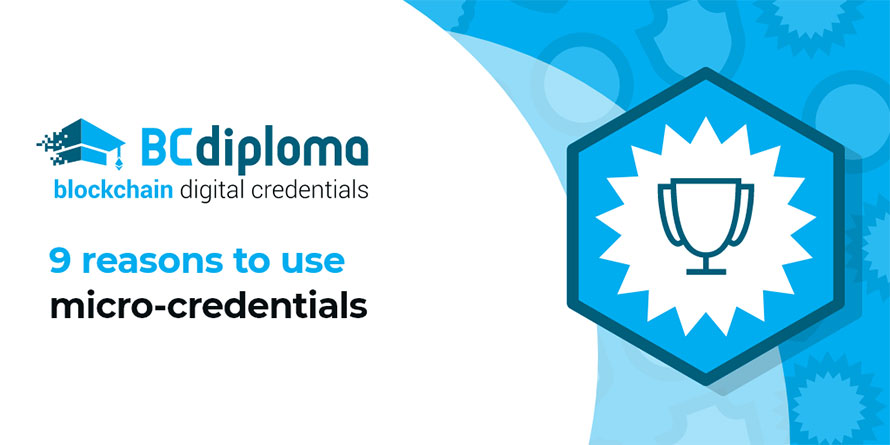Have you ever taken an online exam? Or received a certification in a dematerialized format? In the age of online courses and remote training via Zoom, dematerialized diplomas have become ubiquitous.
Micro-credentials are small-scale training units that attest to a specific knowledge or skill. They are sometimes called digital credentials, NanoDegrees or MicroMasters.
Micro-credentials usually take the form of a digital badge containing all the information required to verify the credential: name of the issuing organization, attribution criteria and date, holder’s name and proof of acquisition.
These Open Badges can be added to one’s LinkedIn profile, resume, or shared via a URL link. They are used in education – on MOOC platforms such as Coursera, OpenClassrooms or edX – as well as for IT certifications (Microsoft, AWS Certified Developer, Scrum Master or Cisco Certified Network Professional (CCNP)).
Widely used in the field of Information Technology, micro-credentials are the guarantee that future employees have mastered the tools required before any hire is made. So without further ado, let’s take a closer look at nine reasons to use a micro credential.
1 − Micro-credentials can attest to your future employer or client that you have indeed mastered specific skills or knowledge
Micro credentials examples increase the employability of job seekers and freelancers. For instance, graduates can add them to their CV to attest to their software or language skills.

2 − Micro-credentials can be earned faster than a traditional university education, thus increasing learning agility
A micro-credential is the validation of a specific skill, and is often much quicker to earn than a typical license or diploma. Coupled with a training program that can last a few weeks or months, or is carried out in parallel to a salaried job, micro-certifications increase the flexibility and adaptability of training.
3 − Micro-credentials are a lot less expensive than a full-fledged diploma
Micro-credentials are undoubtedly more accessible than a private diploma. They are often paid for with the compte personnel de formation (CPF − personal training account), so jobseekers can earn skills certificates to supplement their training without undermining their budget.

4 − Digital credentials are more targeted, and therefore more relevant than longer courses
With micro-credentials, learners don’t need to waste time learning skills they won’t actually need! For instance, web developers can continuously train on the job to supplement their knowledge of a specific computer language.
5 − Micro-credentials help people gain experience by becoming a trainer
The Open Badge system allows people to become trainers for a professional tool they have mastered, by obtaining a micro-credential that ensures the quality of the training and attests to the competence of future students. This type of training program can also be financed with the CPF. Certification to become a trainer can be obtained through a skills assessment, in the framework of a professional retraining for instance.

6 − On-demand online training helps educational organizations remain competitive
The COVID-19 pandemic has greatly increased demand for online training and upskilling. With micro-credentials, universities and training organizations can nimbly meet this demand through a wide range of training courses. And by making micro-credentials available to their alumni network, universities can enrich their overall offering.
7 − Micro-credentials are recognized worldwide
Micro-credentials help attract new students from all over the world thanks to their international recognition. The Open Badge is a flexible and reliable certification system for employers and credentialing organizations that facilitates skills recognition on an international scale.
With micro-credentials, the future of education will be to learn from organizations that can be anywhere!

8 − Micro-credentials meet the strictest quality and transparency standards
Numerous universities are considering standardizing micro-credentials on an international scale. Indeed, several standardization efforts have been initiated, such as the Credential Transparency Description Language (CTDL). Developed in the United States, this database uses a common vocabulary for diplomas, certifications, training badges, etc.
9 − Blockchain ensures the inalterability, security and conservation of micro-credential data
BCdiploma is the first company to use 100% blockchain-based technology for its micro-credentials. By choosing blockchain digital credentials, you benefit from tamper-proof, verifiable, and long-lasting accreditation, thanks to the decentralized and secure nature of blockchain
Micro-credentials, a genuine opportunity for the future of education
Micro-credentials have the potential to significantly expand educational opportunities around the world.
The digital format is very convenient as it can be shared via email, but it is not always secure. Developments in algorithmic research, and in particular blockchain technology, have led to a massive leap forward in terms of reliability, durability and security.
Discover BCdiploma and its digital credentials
BCDiploma is a French company that provides blockchain-secured digital micro-credentials. Discover our blockchain certification system used by more than 120 institutions in 18 countries around the world.
